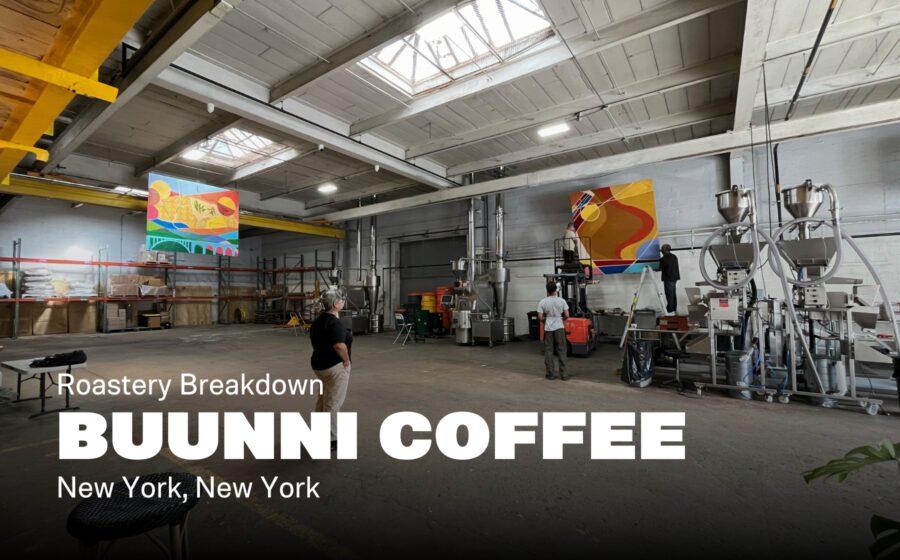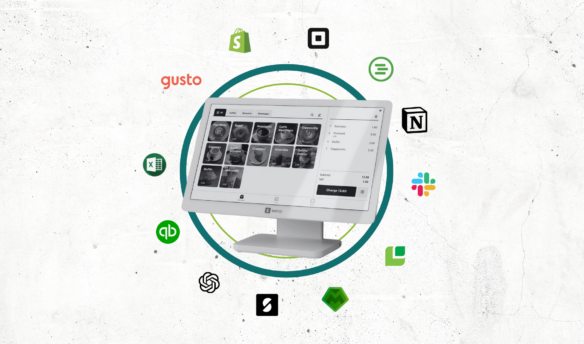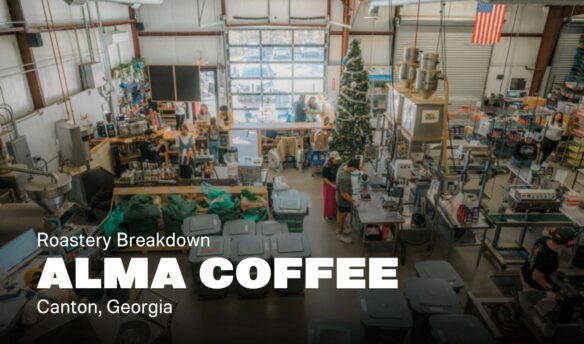The Roastery Breakdown series is presented by our partner, Loring.
New York is a coffee city. But with its countless roasteries and coffee shops on every corner, opening a business here that feels unique can be challenging. Potential new coffee business owners have to ask questions like, “How do I set myself apart?” and “What do I bring to this space that’s different?”
Married couple Elias Gurmu and Sarina Prabasi began asking themselves those same questions when they opened Buunni Coffee in 2012. The couple, who met in Ethiopia and ended up in the Washington Heights neighborhood of Upper Manhattan, decided to create a community-centric space that would highlight coffees from Ethiopia.
Much of the New York specialty coffee world is centered in Brooklyn, and Prabasi says that their business grew “under the radar.” But it also meant they could stand apart from the rest of the industry, and focus on an underserved community. Now the couple have four cafes across Washington Heights and Inwood.
“We were doing our own thing Uptown where there was this sort of blind spot in the specialty world,” says Prabasi. “And I feel the same way about the Bronx.”
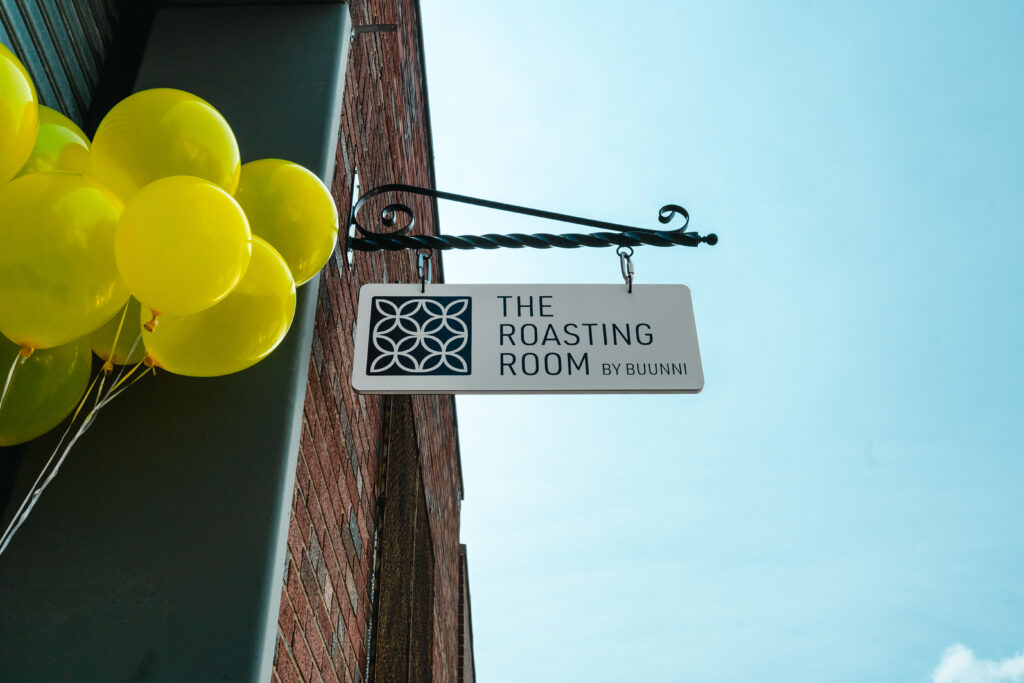
The couple opened their newest venture, The Roasting Room, in the South Bronx this past September. The Roasting Room is a communal roasting and educational space designed to serve coffee pros and enthusiasts living in the area.
“A lot of people who work in the coffee industry live in the Bronx. And yet there isn’t a place where they can get specialty training in the Bronx,” Prabasi says. “There isn’t a place where they can hang out and learn about roasting or just have more coffee resources.”
Although Buunni roasts coffee out of the space, Prabasi is clear that it is open to other area businesses and individuals. “It’s not the Buunni Roastery—it’s [called] The Roasting Room because it can be your roasting room.”
It All Starts in Ethiopia
Coffee originated in Ethiopia—and so did Buunni. Gurmu was born and raised in Ethiopia, and met Prabasi, originally from Nepal, while she was working for a nonprofit agency. “That’s where we started having coffee together, that’s where we got married, so coffee has been a big part of our personal story,” she says.
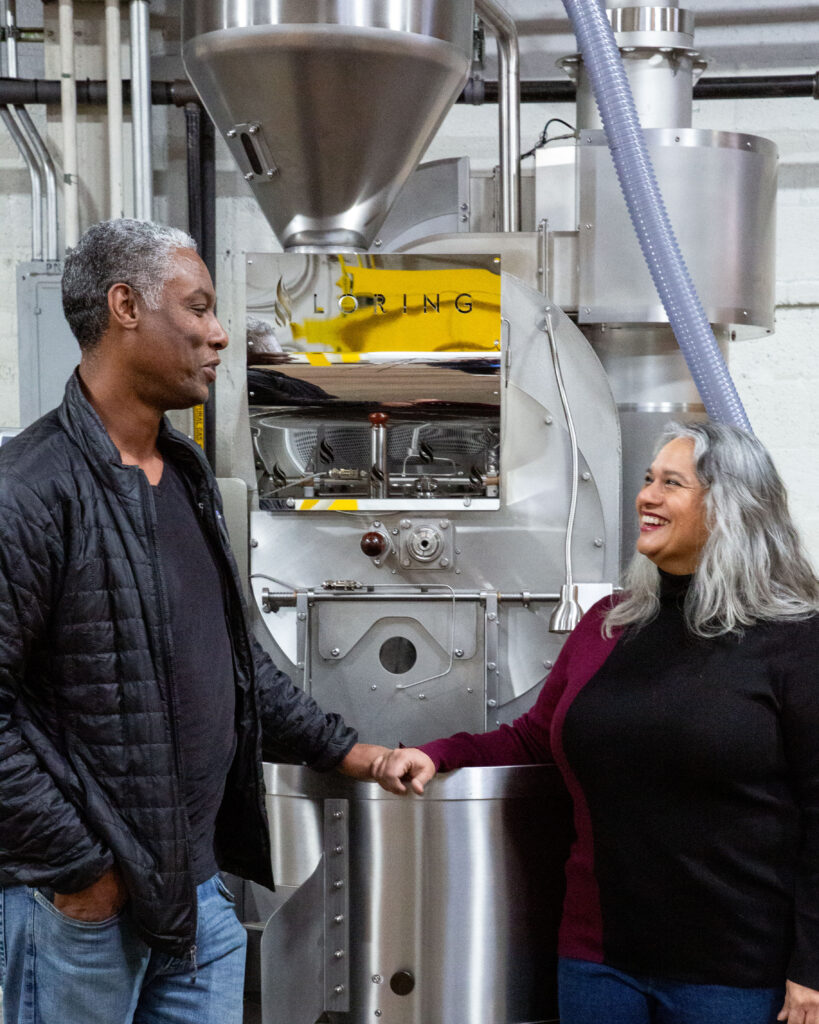
Prabasi’s nonprofit work later took the couple to New York, where they decided to harness Gurmu’s entrepreneurial spirit and coffee knowledge to open the first Buunni location. “As we were thinking [the business] through, this little spot opened up around the corner from where we lived,” recalls Prabasi. “One thing led to another, and we ended up opening a cafe.”
Initially, Buunni only served coffee from Ethiopia. “In the beginning, we really focused on sourcing from co-ops, which are pretty strong in Ethiopia,” Prabasi says. While it has since added coffees from all over the world to the menu, Buunni still aims to highlight Ethiopian coffee and hospitality.
As Buunni grew, the business switched from roasting its own beans to working with a toll roaster, because the demands of operating multiple cafes took priority.
But Prabasi says she and Gurmu still had extensive input into the coffees. “We selected our own green coffee, especially Ethiopian coffee … [and] we were able to select what we wanted so we could be sort of hands-on, but we weren’t doing the roasting ourselves.” As the cafes became more stable, they went back to roasting their own coffees.
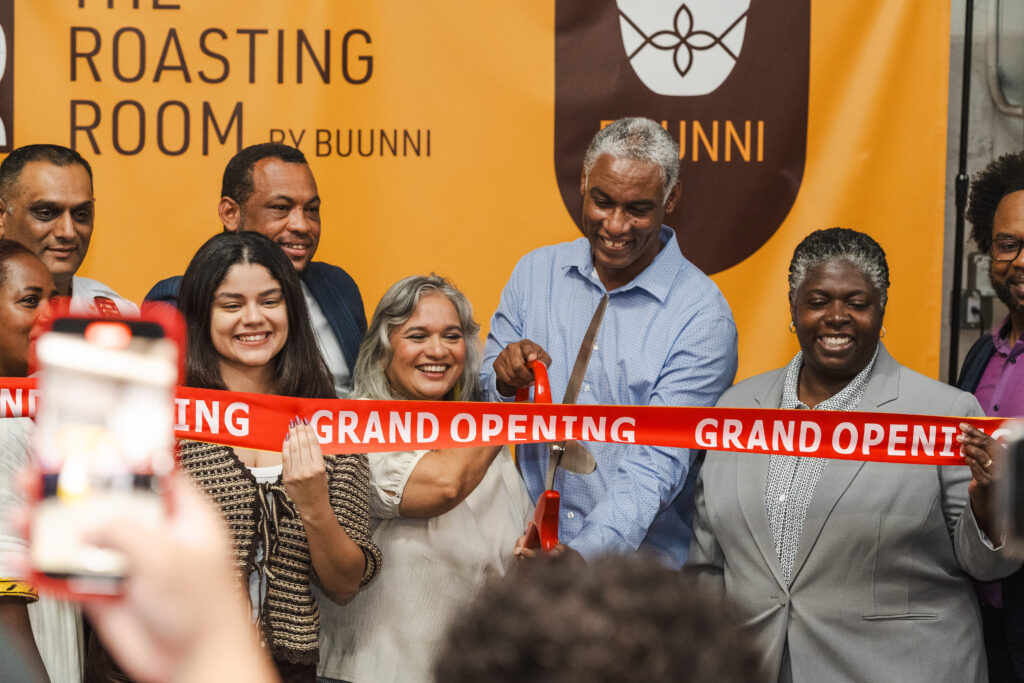
Meanwhile, Prabasi was still working in the nonprofit sector. In 2019, she decided to take what she initially thought would be a short sabbatical from work. “I started that six months off and then, of course, it was the pandemic and it was really all hands on deck—we gotta save the business,” she says. Now she works at Buunni full-time. “I feel very happy about that.”
Quick Facts:
Roastery location: The Bronx, New York
Square footage: 5,000 square feet
Pounds roasted: 14,000lb*
Retail and/or wholesale roasting: Both
*This number reflects the roasting capabilities of The Roasting Room
Equipment Breakdown
Communal Access: The Roasting Room is a co-roasting space and has two S35 Kestrel roasters from Loring. Prabasi says they chose Loring roasters “because of its lower carbon footprint and because it doesn’t generate smoke/air pollution. This was important to us because we were very aware of coming into the Bronx, an area that has long suffered from air pollution and environmental injustice. We knew we didn’t want to add to these problems.”
Buunni’s roasting team roasts all their coffee on the Lorings, but the machines are also available for other roasters, who rent time slots(Buunni sets aside one day a week on the roasters to roast coffee for both its retail stores and wholesale clients). Each client also gets access to shelving, grinders, and packing materials as a part of their rental.

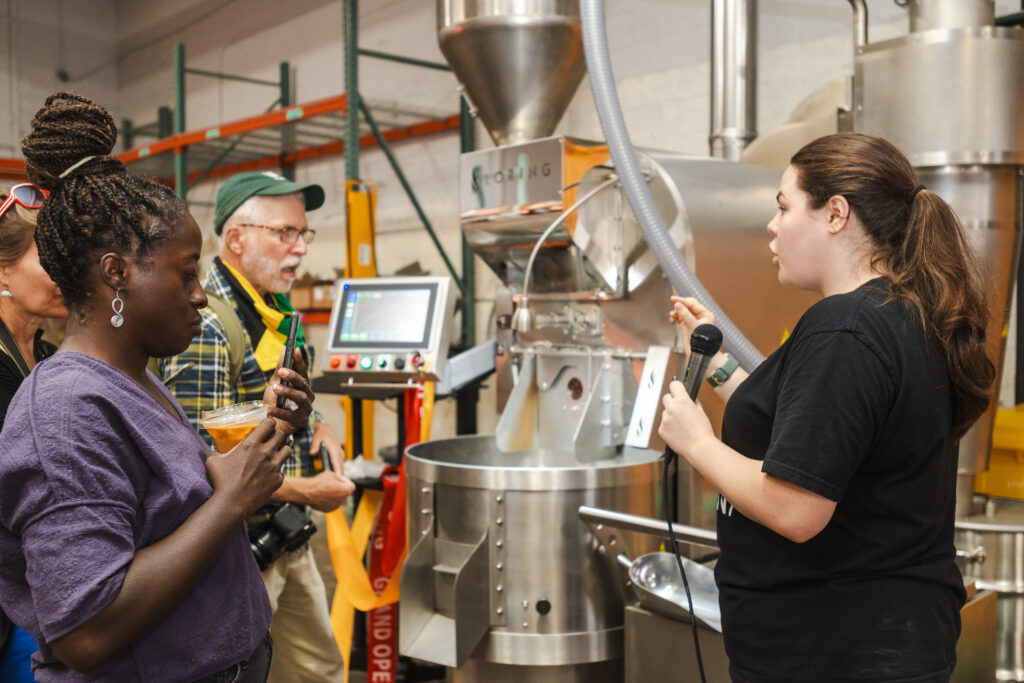
At some point in the future, Prabasi says they’d like to make the roasting space easier to navigate for roasters who want to maintain organic certification, “because a lot of the shared facilities don’t have organic capability.”
Organically certified coffees must be roasted in specially designated roasters, or a “purge” coffee must be roasted in between non-organic and organic batches. “We would really like to dedicate one of the roasters for organics so we don’t have to do a whole purge cycle,” she says.
Sample Roasters: Buunni uses two sample roasters, a Roest and an Ikawa, not just for its own sample roasts but also for its wholesale and toll-roasting clients. “The sample roasting is really a key part of our onboarding process and one of the first steps in understanding what our new client[s], especially if they are new to us, want,” Prabasi says. They use these roasters nearly every day.
Relax Room: Just off from the roasting machines is a break room. Prabasi says they put in a break room for people using the space to escape the loudness of the roasters and “have a space to just think, send a few emails, or just eat your snacks,” she says. “Yeah, we also have a snack drawer.”
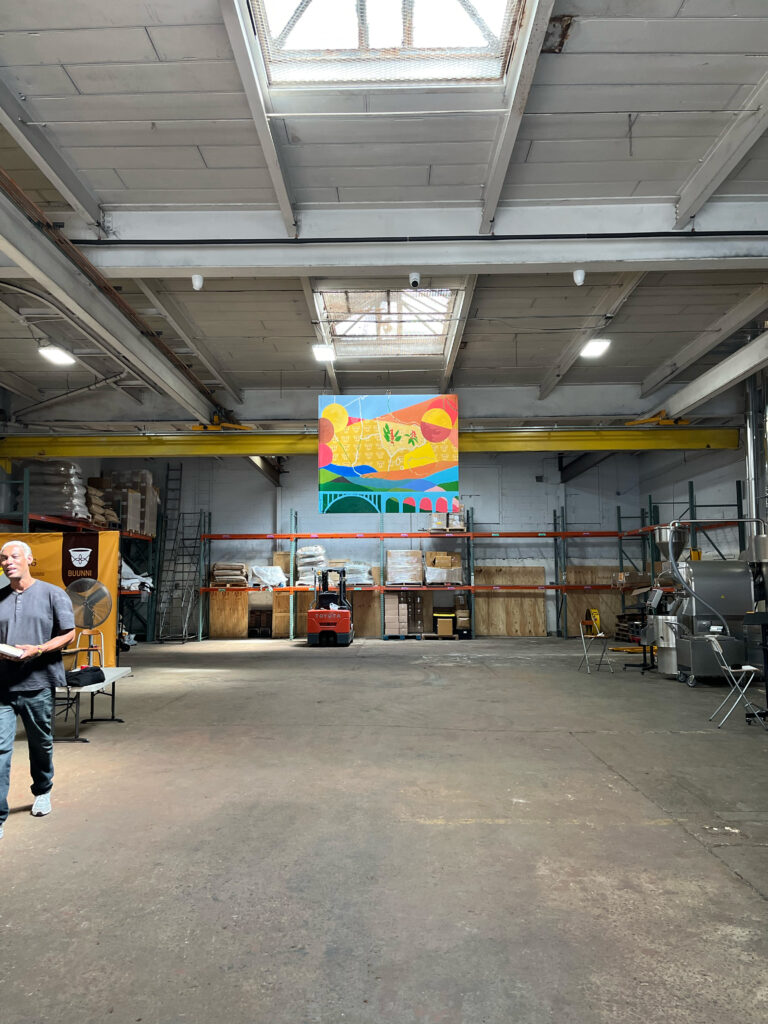
Movability: The Roasting Room has a forklift and lots of movable bins and items to help people get things from one place to another. The forklift and “anything with wheels and castors” help clients move green coffee around the space. Prabasi says that while she personally doesn’t drive the forklift, “the people who are using it get a lot of joy from that.” She also highlighted bean carts as a great tool for moving small batches of coffee through the roastery.
Roastery Reflecting Values
Every corner of the roastery reflects Buunni’s foundations in Ethiopia and its commitment to its Bronx coffee community. Hanging from the high ceilings are large murals by the Ethiopian New York-based artist Kibrom Gebremedhin Araya. Araya made the murals from the wooden pallets the Loring roasting machines were shipped with. The roastery also features other works by local artists, a carryover from how Buunni curates art in all its shops.
In the future, Prabasi wants to offer classes focusing on topics like latte art and cupping, hosted by local baristas and coffee professionals “We would really like The Roasting Room to be a place where people can show off some of that knowledge; to be acknowledged, recognized, and celebrated for their knowledge,” she says.
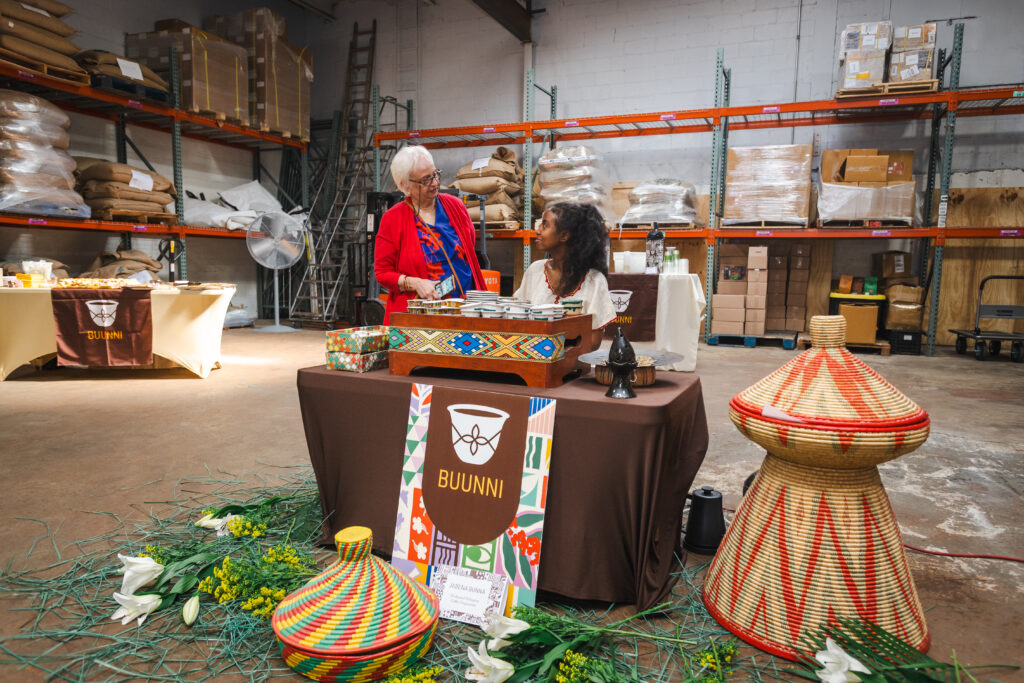
Although the space is open to all, The Roasting Room is especially aimed at serving the local community. This harkens back to the observations that Prabasi made early in Buunni’s existence: that coffee culture solely focused on Brooklyn overlooks other thriving coffee communities. She hopes The Roasting Room will help combat those blind spots.
“What we want to do is offer the space, but also recognize that there’s expertise beyond who we always think of as experts [because] there’s this whole level of coffee experience that is not so visible or highlighted.”



